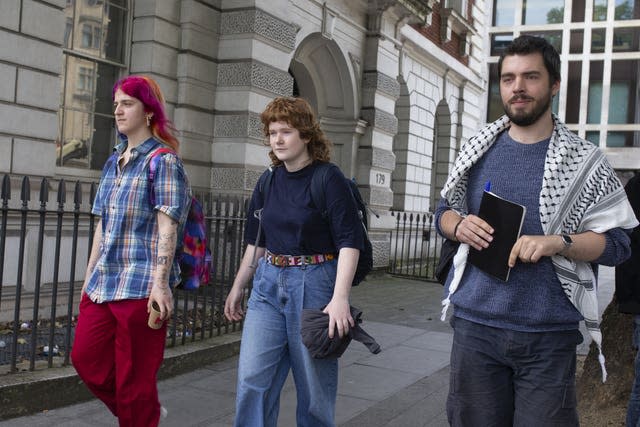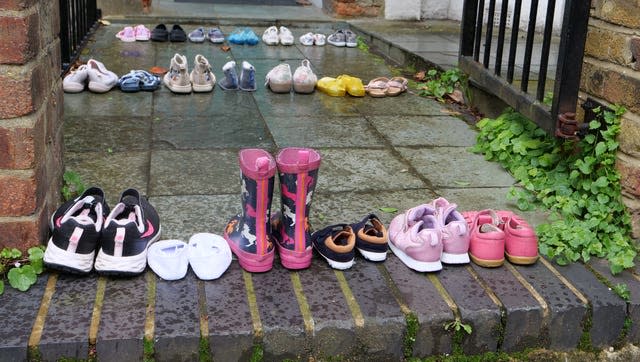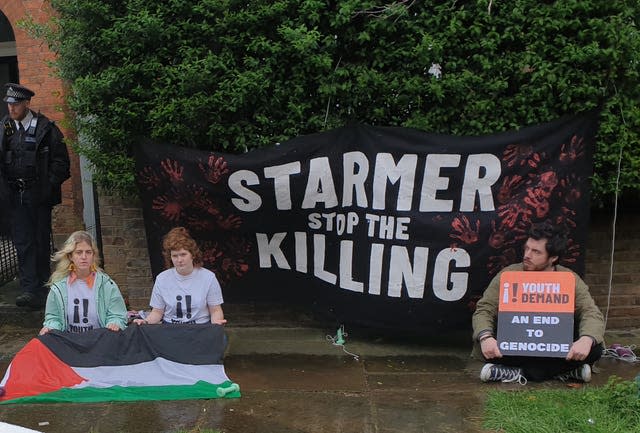Pro-Palestine protesters avoid jail after targeting Sir Keir Starmer’s house
Three pro-Palestine protesters have avoided jail after demonstrating outside the house of Sir Keir Starmer.
Leonorah Ward, 21, of Leeds, Zosia Lewis, 23, of Newcastle-upon-Tyne, and Daniel Formentin, 24, of Leeds, hung a banner outside the London property that read, “Starmer stop the killing”, surrounded by red handprints, on April 9.
They also placed four rows of children’s shoes in front of the property to signify the young people killed in Gaza.
The trio were found guilty under Section 42 of the Criminal Justice and Police Act 2001 after a one-day trial at Westminster Magistrates’ Court.

They were each sentenced to six weeks’ imprisonment, suspended for 12 months, and ordered to pay £200 in legal costs.
District Judge Michael Snow said he could “understand why politicians are so fearful” given the “number of attacks on our democracy”.
“The person who resides here is a senior politician,” he continued.
“In the last two years, two Members of Parliament have been murdered.
“Anyone in that situation being aware that there were protesters directly outside their home is likely to be caused distress.
“It is laughable to assert to the contrary.”
The protesters were representing the group Youth Demand, which describes itself as a “new youth resistance campaign fighting for an end to genocide”.

Giving evidence at the trial, Sir Keir’s wife Victoria said she felt “a bit sick” when she encountered the trio at her home, and drove around the corner in her car.
“I felt apprehensive and uncomfortable,” she added.
The judge said Lady Starmer had been a “compelling and persuasive” witness.
Asked by Andrew Morris, defending, if she knew it was a “peaceful protest”, Lady Starmer said: “It would look like a peaceful protest if it hadn’t been outside my home.”
Section 42 powers cover the harassment of a person at their home address if an officer suspects it is causing alarm or distress to the occupant.
Formentin told the court he targeted Sir Keir because he believed the Labour leader was “not accurately representing the country” over the conflict.
“There is an overwhelming sense that young people in this country do want a ceasefire in Palestine,” he claimed.
Marketing consultant Formentin, who wore a keffiyeh pattern scarf, said the protesters had taken “as many steps as we could to mitigate any threat”, and had no plans to confront anyone.
Put to him by the prosecution that they still would have been intimidating and threatening, Formentin replied: “No.”
Fellow defendant Lewis said: “We weren’t planning on staying there the whole day.
“We didn’t want to scare anyone.”

Ward told the court she “didn’t take the action lightly” and that steps had been taken to ensure the address of the residents was not revealed.
A police sergeant who responded to the demonstration told the court that holding the protest outside somebody’s house – instead of outside the House of Commons or Sir Keir’s offices – was “inappropriate”.
Delivering his sentence, Judge Snow said the trio had been directed to leave the premises but had “continued” regardless.
The group was “just trying to shout more loudly” by picking the Starmer home as a protest location, he added.


